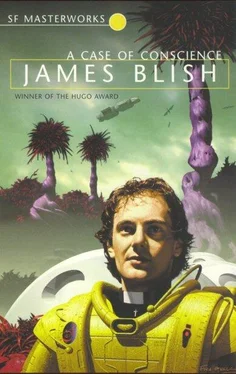“I should think he’d be open to charges of inciting to riot,” Michelis said.
“He hasn’t incited any riots that I’ve heard about,” Ruiz-Sanchez said. “The Frisco affair happened spontaneously as far as anyone could see—and I noticed that the pictures didn’t show a single one of those uniformed followers of his in the crowds.”
“But he praised the rioters’ spirit, and made fun of the police,” Liu pointed out. “He as good as endorsed it.”
“That’s not incitement,” Michelis said. “I see what Ramon means. He’s smart enough to do nothing for which he could be brought to trial—and a false arrest would be suicide, the UN would be inciting a riot itself.”
“Besides, what would they do with him if they got a conviction?” Ruiz asked. “He’s a citizen, but his needs aren’t like ours; they’d be chancing killing him with a thirty-day sentence. I suppose they could deport him, but they can’t declare him an undesirable, alien without declaring Lithia a foreign country—and until that report is released, Lithia is a protectorate, with a right to admission to the UN as a member state!”
“Small chance of that,” Michelis said. “That would mean ditching Cleaver’s project.”
Ruiz-Sanchez felt the same sinking of the heart that had overcome him when Michelis first gave him that news. “How far advanced is it now?” he asked.
“I’m not sure. All I know is that they’ve been shipping equipment to him in huge amounts. There’s another load scheduled to leave in two weeks. The scuttlebutt says that Cleaver has some kind of crucial experiment ready to go as soon as that shipment gets there. That puts it pretty close—the new ships make the trip in less than a month.”
“Betrayed again,” Ruiz-Sanchez said bitterly.
“Then is there nothing you can do, Ramon?” Liu asked.
“I’ll interpret for Egtverchi and Chtexa, if anything comes of that project.”
“Yes, but…”
“I know what you mean,” he said. “Yes, there is something decisive that I can do. And possibly it would work. In fact, it is something that I must do.”
He stared blindly at them. The buzzing of the bees, so reminiscent of the singing of the jungles of Lithia, probed insistently at him.
“But,” he said, “I don’t think that I’m going to do it.”
Michelis moved mountains. He was formidable enough under normal conditions, but when he was desperate and saw a possible way out, no bulldozer could have been more implacable in crushing through an opening.
Lucien le Comte des Bois-d’Averoigne, late Procurator of Canarsie, and always fellow in the brotherhood of science, received them all cordially in his Canadian retreat. Not even the sardonically silent figure of Egtverchi made him blink; he shook hands with the displaced Lithian as though they were old friends meeting again after a lapse of a few weeks. The count himself was a large, rotund man in his early sixties, with a protuberant belly, and he was brown all over: his remaining hair was brown, his suit was brown, he was deeply tanned, and he was smoking a long brown cigar.
The room in which he received them—Ruiz-Sanchez, Michelis, Liu, and Egtverchi—was a curious mixture of lodge and laboratory. It had an open fireplace, rough furniture, 257 mounted guns, an elk’s head, and an amazing mess of wires and apparatus.
“I am by no means sure that this is going to work,” he told them promptly. “Everything I have is still in the breadboard stage, as you can see. It’s been years since I last handled a soldering iron and a voltmeter, too, so we may well have a simple electronic failure somewhere in this mass of wiring—but it wasn’t a task I could leave to a technician.”
He waved them to seats while he made final adjustments. Egtverchi remained standing in the rear of the room in the shadows, motionless except for the gentle rise and fall of his great chest as he breathed, and an occasional sudden movement of his eyes.
“There will be no image, of course,” the count said abstractedly.
“This giant J-J coupling you describe obviously doesn’t broadcast in that band. But if we are very lucky, we may get some sound… Ah.”
A loudspeaker almost hidden in the maze crackled and then began to emit distant, patterned bursts of hissing. Except for the pattern, it seemed to Ruiz-Sanchez to be nothing but noise, but the count said at once:
“I’m getting something in that region. I didn’t expect to pick it up so soon. I don’t make much sense of it, however.”
Neither did Ruiz, and for a few moments he had all he could do to get over his amazement. “Those are signals—the Message Tree is broadcasting now?” he said, with a touch of incredulity.
“I hope so,” the count said drily. “I have been busy all day installing chokes against any other possible signal.”
The Jesuit’s respect for the mathematician came close to awe. To think that this disorderly tangle of wiring, little black acorns, small red and brown objects like firecrackers, the shining interlocking blades of variable condensers, massively heavy coils, and flickering meters was even now reaching directly through the subether, around fifty light-years of space-time, to eavesdrop on the pulses of the crystalline cliff buried beneath Xoredeshch Sfath…
“Can you tune it?” he said at last. “I think those must be the stutter pattern—what the Lithians use as a navigational grid for their ships and planes. There ought to be an audio band—”
Except, he recalled suddenly, that that band couldn’t possibly be an “audio” band. Nobody ever spoke directly to the Message Tree—only to the single Lithian who stood in the center of the Tree’s chamber. How he got the substance of the message transformed into radio waves had never been explained to any of the Earthmen.
And yet suddenly there was a voice.
“—a powerful tap on the Tree,” the voice said in clear, even, cold Lithian. “Who is receiving? Do you hear me? I do not understand the direction your carrier is coming from. It seems inside the Tree, which is impossible. Does anyone understand me?” Silently, the count thrust a microphone into Ruiz’ hand. He discovered that he was trembling.
“We understand you,” he said in Lithian in a shaky voice. “We are on Earth. Can you hear me?”
“I hear you,” the voice said at once. “We understood that what you say is impossible. But what you say is not always accurate, we have found. What do you want?”
“I would like to speak to Chtexa, the metallist,” Ruiz said. “This is Ruiz-Sanchez, who was in Xoredeshch Sfath last year.”
“He can be summoned,” said the cold, distant voice. There was a brief hashing sound from the speaker; then it went away again. “If he wishes to speak to you.”
“Tell him,” Ruiz-Sanchez said, “that his son Egtverchi also wishes to speak to him.”
“Ah,” said the voice after a pause. “Then no doubt he will come. But you cannot speak long on this channel. The direction from which your signal comes is damaging my sanity. Can you receive—a sound-modulated signal if we can arrange to send one?”
Michelis murmured to the count, who nodded energetically and pointed to the loudspeaker.
“That is how we are receiving you—now,” Ruiz said. “How are you transmitting?”
“That I cannot explain to you,” said the cold voice. “I cannot speak to you any longer or I will be damaged. Chtexa has been called.”
The voice stopped and there was a long silence. Ruiz-Sanchez wiped the sweat off his forehead with the back of his hand.
“Telepathy?” Michelis muttered behind him. “No, it fits into the electro-magnetic spectrum somewhere. But where? Boy, there sure is a lot we don’t know about that Tree.”
Читать дальше











